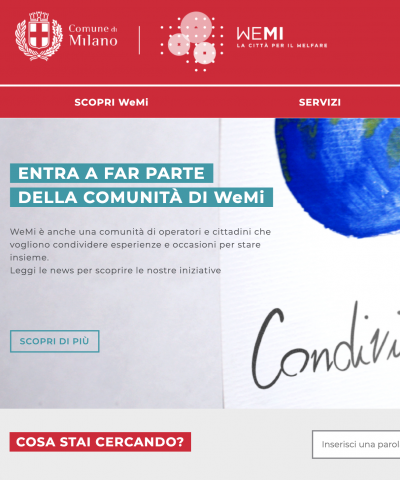WeMi: digital platform for care and welfare homeservices - Milan
Milan (Italy)
Wemi.milano.it is a digital marketplace which allows citizens to easily connect to care and welfare homeservices. Such services are provided by social enterprises and no-profit entities through qualified professionals. Providers are certified by Milan Municipality.
If an elderly person needs some help for washing her/himself or cleaning, if a pupil needs some help in socializing or in preparing his/her homework, if you are looking for a housekeeper who can help you… for these and many other needs, the easiest way for finding information and buying services from certified providers is via wemi.milano.it. Collect information, find out different providers, choose the service you need and pay for that directly and transparently online.
Services are grouped in 4 main areas: welfare services, caregiving, inclusion for newcomers, financial education. Up to now, 300 services have been provided by 53 no-profit entities and they are available on the platform.
Thanks to SPID, the Public System for Digital Identity employed in Italy, users can log-in and safely manage orders and payments. You can also express your feedback about the service you received and help others to make the best choice for their needs. If you benefit from a social voucher or any other social aid, you can easily use them directly as both systems are digitally integrated.
If you are a service provider or a professional in the field of caregiving and home services, you can also easily apply for being certified as a provider or to get in touch with one of them.
If you don’t feel at ease with digitalisation, no problem: in each city district you can get in a Wemi space and meet people who can help you in finding what you need. Wemi spaces are managed by associations and NGOs, they are aesthetically welcoming, so that you will feel perfectly comfortable.
1) it improves accessibility to homeservices by citizens, and the growing number of citizens who use the platform for ordering and paying such services is a meaningful proof (as of April 2022: 3,964 citizens using the platform);
2) it facilitates the coordination and supervision of services providers, and also on this side numbers show a growing success (April 2022: 53 certified entities and 4,282 professionals involved).
